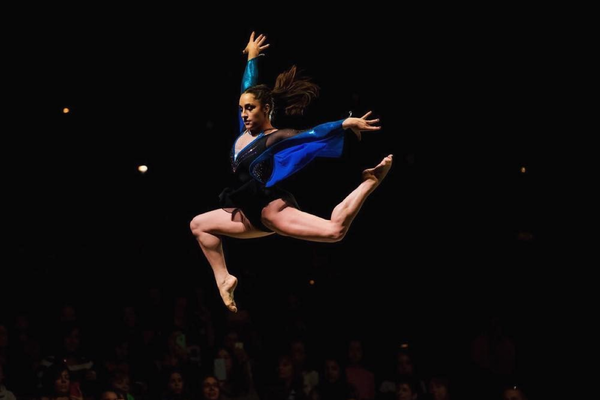

It’s not every day that you see a college gymnastics head coach sign up for a reality show. However, the Olympic gold medal-winning gymnast, turned Arkansas head coach, did just that. The gymnastics icon didn’t just sign up for any show, but one that pushes their contestants to their physical limit, Special Forces: World’s Toughest Test.
However, now that the 29-year-old is done filming the third season of the reality show, she has opened up about her experience. “I didn’t know what I was getting myself into,” the Olympic medalist said, as per Whole Hog Sports. Yet the confidence she had before filming remains intact. Unfortunately, the source of Olympian’s confidence and mindset has a much darker past.
ADVERTISEMENT
Article continues below this ad
Positivity didn’t build the gymnast’s sense of resilience
Those who tuned in for the two-hour season premiere of Special Forces saw Olympic gold medalist Jordyn Wieber have an anxiety attack on screen. However, they also witnessed the former ‘fierce five’ member compose herself before getting back to the task at hand. Wieber’s reaction was a clue to the lasting effects of handling immense mental pressure for years in gymnastics.
“In the sport of gymnastics, it was really intense… The main motivating force was fear. We weren’t allowed to show emotion,” the gymnast said, as per a report by People Magazine. The ability to compose herself under overwhelming pressure is an admirable trait. Yet, how Jordyn Wieber picked up that trait was far from admirable.

“I think a lot of us post-gymnastics have realized that it has long-lasting impacts on us as people,” admitted the 2012 Olympic gold medalist. During the London Olympics, Wieber was part of an elite team of gold medalists such as Ally Raisman and Gabby Douglas and made relentless sacrifices under then Team USA head Martha Karolyi.
What’s your perspective on:
Is fear-based training in gymnastics a relic of the past, thanks to leaders like Wieber?
Have an interesting take?
Despite guiding Team USA through 11 Olympic games as a coach, Karolyi’s legacy has been marred by allegations of unfair treatment and even neglected injuries, all in the name of pursuing Olympic golds. What made the harsh training even worse was that the gymnast-turned-coach was among the victims of the maligned and convicted Larry Nassar. Yet, despite the traumatic experience, Wieber is doing her best to make things better for the newer generations.
Jordyn Wieber leads by example
Despite their past trauma, the 29-year-old and several other champions who suffered under the old system continue to take steps to bring change. This is a big reason why the former UCLA gymnast became a coach in the first place. Wieber is among the ranks of those who believe that the athlete is more than a means to an end, that end being Olympic gold. Beyond her professional efforts, Wieber’s personal life has also been a source of joy and support. In October 2023, she married fellow gymnast and former Olympic team member Chris Brooks, who shares her passion for gymnastics and advocacy for athlete well-being.
So now, as the head coach of the Arkansas Razorbacks, Wieber ensures that those who train under her do not show up out of fear. Instead, the former world champion hopes to inspire her girls to improve. This was another Wieber who participated in the show. “I think it’s such a great example for our student-athletes to see their coach getting out of their comfort zone and challenging themselves,” the Olympian told Whole Hog Sports.
ADVERTISEMENT
Article continues below this ad

ADVERTISEMENT
Article continues below this ad
“I wanted to be a model of that, regardless of how well I did in the show,” added the coach. In fact, Jordyn Wieber’s mindset to do things the right way matches that of fellow gymnast and victim Simone Biles. Biles didn’t just express pride that she redeemed herself in Paris but did so in the right way, without ignoring the warning signs.
“After all these years of putting the mental work in, it’s paid off,” Biles said in August 2024, as per Olympics.com. Similarly, through competing in reality shows, the Olympic gold medal-winning gymnast hopes to become the role model she never had.
ADVERTISEMENT
ADVERTISEMENT
ADVERTISEMENT
ADVERTISEMENT


Is fear-based training in gymnastics a relic of the past, thanks to leaders like Wieber?